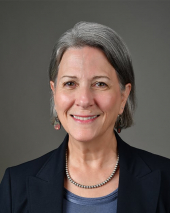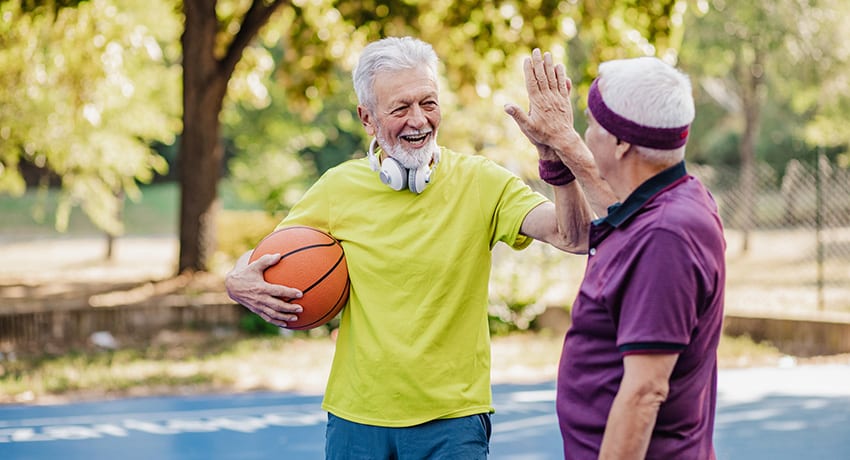You may have heard the joke: The secret to living a long, healthy life is choosing the right parents! While there may be some truth to it, healthy aging is more than just a roll of the dice.
“We have patients in their 90s who are still driving, and we have patients in their 60s who are using a walker,” said Maureen S. Beck, DNP, gerontological nurse practitioner and co-director of UT Physicians Center for Healthy Aging – Bellaire. “A lot of it is genes and luck, but a lot of it is also our lifestyle choices, things we can control. As it turns out, the key to healthy aging is really quite the same as healthy living.”
In recognition of Older Americans Month, Beck shares her advice for living a longer, healthier, and happier life based on the traits she has observed of her patient champions.
A little maintenance goes a long way

“A house or car only holds up as well as we take care of it. Our bodies are no different,” Beck said. “Some ‘maintenance’ improves your quality of life now and in the future.”
As people grow older, they are more likely to develop chronic health conditions, including heart disease, osteoporosis, and dementia. Only one thing can effectively help fight all these conditions — exercise.
“Moderate exercise not only lowers your risk for heart disease, it strengthens your bones and boosts your brain function,” said Beck, assistant professor in the Joan and Stanford Alexander Division of Geriatric and Palliative Medicine at McGovern Medical School at UTHealth Houston. “Exercise will also help you maintain your weight. People who are not obese usually live longer with fewer health problems.”
Walking, running, or any other activity that requires the feet to hit the floor helps fight osteoporosis, which occurs more in women. Whichever type of fitness suits you, it is best to start now.
“Exercise will keep your legs strong and more mobile as you get older, and you’ll have less arthritis and joint pain,” Beck said. “Your heart and brain will also thank you.”
In addition to exercise, it is important to fuel the body with nutritious food. Many chronic health conditions (i.e., diabetes), illnesses (i.e., high cholesterol), and diseases (i.e., cancer) are often linked to an unbalanced diet.
A smart diet is heavy in non-starchy vegetables and fresh fruits, heavy in plant-based proteins, such as nuts and beans, and light in sugary foods or drinks. The Mediterranean diet aligns with these recommendations and is known to help people live longer and healthier.
“Vegetables and fruits supply the vitamins, minerals, and antioxidants our bodies need to fight sickness and disease. Low-fat proteins supply the amino acids to repair and build our body tissues. Proteins even reduce our food cravings. Water is also the best drink because it hydrates our body without added sugars, chemicals, or fat,” Beck said.
Also, smoking can shave decades off your life. To extend your life and health, kick the habit.
Don’t worry, be happy
Apparently, a positive attitude really does make a difference in your life.
“Our patients who are healthy and independent are generally very positive people. They accept where they are in life and are grateful for each day,” Beck said. “They like to joke, ‘It’s better than the alternative!’”
These optimists possess an ability to adapt to situations and find solutions to their challenges.
“They’re quite resilient and inclined to deal with their health conditions better. They’re pretty good about taking their medications and making lifestyle changes to help them live better,” she said. “Healthy aging isn’t just about your physical health. Studies show your mental health and outlook count just as much.”
You got to have friends
To increase your chance of more tomorrows, keep in touch with family and friends, and stay involved in activities.
“Having a support system is more important as you age. Even our patients who live independently have family or friends who can visit them or help them when they ask,” Beck said. “Plus, socializing gives them a greater sense of purpose for the day.”
People who do not have a spouse, or children who live close by, can still engage with neighbors, college or military friends, and religious or civic organization members. Volunteering or taking a class are also ways to make connections.
“Your relations help you enjoy a happier, fuller life,” Beck said, “and that can help you live longer.”
Take time to visit
This May, be sure to visit an older relative or friend. Even if he or she seems to be doing well, take the time to chat. Older people have plenty of knowledge and interesting stories to share. (They are living history!) They also tend to be good listeners.
Should you ever notice anything of concern, contact a family member or the person’s health care provider.
“By 2040, nearly 22% of the population will be over 65,” Beck said. “We all need to do our part to help one another.”



